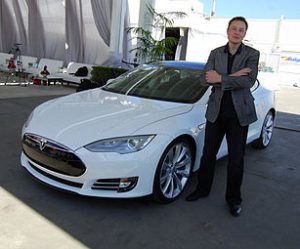The Yin And Yang Of Elon Musk
 At the recent Code Conference, Elon Musk had a wide ranging interview about everything from who he thinks will compete with Tesla in self-driving cars to neural laces that will augment human intelligence and his plans for space travel. But the thing that caught my eye was his assertion that we all are  might be living in a computer simulation.
At the recent Code Conference, Elon Musk had a wide ranging interview about everything from who he thinks will compete with Tesla in self-driving cars to neural laces that will augment human intelligence and his plans for space travel. But the thing that caught my eye was his assertion that we all are  might be living in a computer simulation.
It’s a fantastical idea, to be sure. So much so that it makes you wonder whether to actually take him seriously. Could it be that he actually believes that we’re nothing more than a set of bits in someone else’s computer game? If so, then can he really be trusted to run billion dollar enterprises?
By all appearances, Musk is dead serious about the possibility that we’re living in a computer simulation. And while it is, of course, an utterly impractical and illogical idea, computer technology itself was born out of an illogical idea. It is, in fact, people like Elon Musk, who are able to take a rational approach to utterly improbable ideas, that end up creating the future.
Are We Living In A Computer Simulation?
Ezra Klein at Vox wrote up a more detailed explanation of Elon Musk’s idea, but here it is in a nutshell: Look at how video games are progressing and it seems possible that sometime in the future there will be simulations so advanced that they will become indistinguishable from reality. If so, then how can we know that we’re not living in one?
Musk himself described it this way:
The strongest argument for us being in a simulation probably is the following. Forty years ago we had pong. Like, two rectangles and a dot. That was what games were.
Now, 40 years later, we have photorealistic, 3D simulations with millions of people playing simultaneously, and it’s getting better every year. Soon we’ll have virtual reality, augmented reality.
If you assume any rate of improvement at all, then the games will become indistinguishable from reality, even if that rate of advancement drops by a thousand from what it is now. Then you just say, okay, let’s imagine it’s 10,000 years in the future, which is nothing on the evolutionary scale.
So given that we’re clearly on a trajectory to have games that are indistinguishable from reality, and those games could be played on any set-top box or on a PC or whatever, and there would probably be billions of such computers or set-top boxes, it would seem to follow that the odds that we’re in base reality is one in billions.
Tell me what’s wrong with that argument. Is there a flaw in that argument?
It’s a fascinating thought experiment and an amazing window into how Musk’s mind works. He is simply willing to entertain ideas that few other people will. That, combined with the ability to come up with incredibly creative solutions to problems and no small amount of tenacity, explains how he has been able to build companies like Tesla, SpaceX and SolarCity.
Yet I think he gets a little bit over his skis at the end of his description when he asserts that the argument is flawless. It does have a flaw and it is a very basic one.
Begging The Question
The flaw in Musk’s argument is a very common informal fallacy known as begging the question, in which the conclusion is assumed within the premises. The odds that we are living in a simulation are only billions to one because Musk is assuming that there are advanced civilizations running very complex and realistic simulations.
This is similar to the “everybody knows†type of argument, such as “everybody knows that electric car companies can’t be profitable, therefore Tesla will never be profitable.†The conclusion is only true because it’s already assumed it in the premise. It’s a circular argument. The fact that I’m making it says nothing about Tesla’s ability to make money.
To be clear, I have incredible admiration for Elon Musk and all that he’s accomplished. Further, I think the thought experiment about whether we’re living in a computer simulation to be fascinating and worthwhile (you can find an extended version of it here). Still, Musk asked the question, so I am answering it.
Yet I also think that Musk’s ability to make such an argument and run billion dollar companies says a lot about him and his ability to entertain unlikely, even flawed ideas.
Science And Pseudoscience
Another problem with Musk’s computer simulation idea is that he is engaging in pseudoscience. By that I mean that he is speaking in a language that sounds a lot like science, developing a hypothesis, quantifying it and so on, but is really anything but. For something to qualify as science, it has to be falsifiable.
So, if Musk was able to propose an experiment that could prove or disprove the hypothesis that we are really living in a computer simulation, then his thinking could be called scientific. However, that’s clearly impossible. Any experiment we could devise would also be part of the simulation.
That’s why pseudoscience is a favorite ploy of conspiracy theorists and cranks. It allows them to use fancy words and expound on wild theories, but never requires them to state their hypothesis in a falsifiable way. We can’t prove that space aliens, paranormal behavior and psychic powers don’t exist, so it’s relatively easy for flim flam artists to make a case for them.
But that gets things exactly backwards. The burden of proof is always on the person who is making the proposition. Einstein, to take just one example, made a number of wild assertions, but also suggested experiments that would prove them true or false. That’s the difference between science and pseudoscience.
Yet clearly, Elon Musk is no crank.
A Rational Approach To Crazy Ideas
Yes, the computer simulation idea is a little bit strange, but in many ways, it’s no stranger than starting a space exploration company, investing in electric cars in 2004 or dreaming up a completely new mode of mass transportation. Being willing to entertain crazy ideas is one of the things that makes him such an outstanding entrepreneur.
Yet in his business life, Musk seems almost coldly rational. He doesn’t just spout off crazy ideas, he makes them work. He calculates, strategizes and plans. His businesses, in a sense, are experiments set up to falsify his own notions. That’s how he keeps himself honest. Whatever is not disproven, tends to become wildly successful.
It is that same Yin and Yang of Elon Musk that makes him so extraordinary. He is able to entertain unlikely ideas, while at the same time examining them under a rigorous analytical lens. Just because an idea is unlikely, doesn’t mean that it isn’t true. It just means that it is inconsistent with the facts as we know them today.
So, maybe we are, in fact, living in a computer simulation in some advanced civilization’s version of an Xbox.  In which case, we’d have to assume that whomever is playing the Elon Musk character must have found some excellent cheat codes.
Wait! Before you go…
Choose how you want the latest innovation content delivered to you:
- Daily — RSS Feed — Email — Twitter — Facebook — Linkedin Today
- Weekly — Email Newsletter — Free Magazine — Linkedin Group
 Greg Satell is a popular speaker and consultant. His first book, Mapping Innovation: A Playbook for Navigating a Disruptive Age, is coming out in 2017. Follow his blog at Digital Tonto or on Twitter @Digital Tonto.
Greg Satell is a popular speaker and consultant. His first book, Mapping Innovation: A Playbook for Navigating a Disruptive Age, is coming out in 2017. Follow his blog at Digital Tonto or on Twitter @Digital Tonto.
NEVER MISS ANOTHER NEWSLETTER!
LATEST BLOGS
Three things you didn’t know about credit cards
Photo by Ales Nesetril on Unsplash Many of us use credit cards regularly. From using them for everyday purchases to…
Read MoreFive CV skills of a business-minded individual
Photo by Scott Graham on Unsplash The skills listed on a CV help employers quickly understand your suitability for a…
Read More


